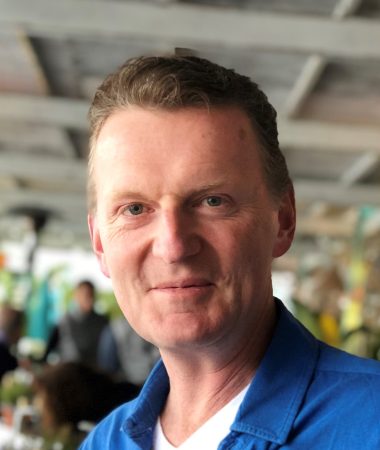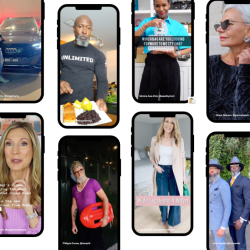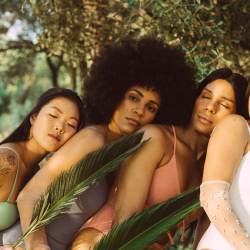In this Storyteller series we explore the impact of new technologies and media on audiences and their behaviour. In this interview we speak with We Are Futures’ Founder, CEO and Chairman. Mark began his career in the army, training soldiers. He then moved to World Challenge to run expeditions before becoming MD — and finally founded National Schools Partnership, which in the last few years has been re-branded into brand and social impact agency, We Are Futures.
It was in the army he first noticed how motivated young people can be, with the right input. Ever since he’s had a fascination with youth, and their attitude and outlook on life.
He now helps brands connect with this audience in an authentic way — to improve their perception among both consumers and the talent of tomorrow. We Are Futures are about adding value to young people; so generally they help brands supplement curriculum content — for example through Sky Arts Access All Arts project.
Hi Mark. So, given your varied career and experience, what stories would you say, these days, resonate with audiences?
First off, not all audiences carry the same long term value. We call people aged 16-24 Emerging Adults (EAs). They’re digital natives who are undergoing huge change as they head towards independent adulthood — from spending habits to self-identity. Their value as consumers, employees and drivers of trends will grow enormously over the next few years and it’s here that brands should be focusing much of their attention. This age group are principled, passionate and have significant influence. Even if the younger ones don’t have spending power now — you can be sure they’re influencing the shopping habits of their parents and peers.
And we know the key issues that matter to them. We’ve done research (both pre- and post-pandemic) that shows today’s young people feel uncertain about their purpose and place in the world. They have anxiety about the future and are finding life less rewarding — all of which is demonstrated by the increased importance in spirituality, and a reliance on social media to stay connected.
Second, they place great importance on career happiness. They’re still desperate to grow and thrive, and are more attracted to companies that can demonstrate a clear career path and a commitment to skills and training.
Next up is their quest for fairness: they’re passionate about issues relating to social equality and diversity, and have less belief in party politics as a way to create change. Finally, they’re a generation that demonstrates fluidity — in their interests, views, identities, and career paths. They’re not a group to be bracketed neatly, seeking variety in everything — from cultural genres to careers.
And among all this, while they are more open to communications from brands than previous generations, they do seek to engage with and work for companies that have a good ethical stance.
How has this changed?

It’s difficult not to bring it back to the pandemic, but this was the single biggest thing that changed the way brands needed to communicate with youth audiences — both during and after. Evidence now shows just how severely education has been impacted — from primary right through to school leavers. Add to that an economic and environmental crisis, which is deeply unsettling for those who are just starting out as adults, and throw in the impact of Brexit and the rapid digital acceleration we’re seeing across all businesses — which are both causing huge disruption to job markets.
Every generation is different to the one before — that goes without saying — but there’s something particularly unique about today’s young people. Covid has defined their youth and with it their futures and together with all the other factors in play we have a unique combination that is making the changes in this generation greater than any we have seen before.
Any help brands can offer as our young people try to navigate these unprecedented times will be jumped on and won’t be forgotten. Brands who sit on the sidelines offering words (but not solutions or services), will not make a positive impression on tomorrow’s adults. But those who step up, change lives and help individuals will reap the benefits, now and in the years to come.
Brands need a long-term vision and should be considering different strategies instead of the usual short term, reactive thinking. Young people suffered hugely through the lost years of education and experience, so those businesses who can now offer on the job training, skills training and mentorship will be the ones talent are attracted to. And those who attract the very best talent will naturally benefit down the line.
How do emerging platforms play into this?
As well as our more physical, often classroom-based programmes, we are building AR experiences and digital escape rooms that centre around learning in a more immersive way so, yes, coupled with the right platform and tech, there is enormous potential to engage with people in deeper and more meaningful ways. However, we need to ensure we don’t create a digital divide and foster exclusion; if we only focus on the latest tech — which might not be available to a broad audience of young people.
That said, the right approach should not be platform-led, but message-led. It’s about being accessible and reaching young people with important messages, not necessarily chasing the latest platform or adopting the latest tech.
We need to always be mindful of how young people consume content and brand messaging. While businesses are still operating their brand consumer activity (both content and channels) very differently from their talent and recruitment activity — the reality is it’s not received differently by young people. They pick it all up and don’t differentiate. How you behave on social media, what your TV commercials say, your CSR and your recruitment offering — is all looked at as one holistic reflection of the business.
All of which means that it’s essential that brands not only work hard to add positive value to the lives of individuals, communities and prospective talent — but that they apply a single voiced approach to everything they say.
Featured image: Sky Arts Access All Arts































